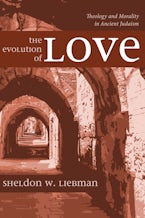This book, an examination of Judaism as it evolved over a period of approximately 1,500 years, is an analysis of the Hebrew Bible and other ancient Jewish writings, with special emphasis on theology and morality. By the middle of the first millennium, with the writing of Deuteronomy, the Psalms, and the works of the prophets, Judaism had embraced the idea that God is a compassionate father; that His relationship with His people is based on love rather than fear; and that His response to their commission of sins is based on the assumption that they are capable of repentance and worthy of forgiveness. In the final stage of its development--culminating in the first and second centuries AD--Judaism was understood to require its adherents to enact the will of God--specifically, to establish a community based on political, economic, and social laws that enforce the principles of justice and mercy. And that process came to be seen as inevitably dependent on human agency--the need for human beings to fulfill God's commandments. In Judaism, loving neighbors (and strangers) came to be understood as the principal--and, for many Jews, the only--way of loving God.
Sheldon W. Liebman was professor emeritus and former chair of humanities at Wilbur Wright College. He was the author of The Great Betrayal: Christians and Jews in the First Four Centuries (Wipf & Stock, 2018). Among his other thirty-plus scholarly publications are an article on Emerson in the Oxford University Encyclopedia of American Literature, an essay in Harold Bloom’s Nathaniel Hawthorne, and a study of The Picture of Dorian Gray in the Norton Critical Edition of that novel. He received a PhD in English from the University of Pennsylvania in 1972.
“For Sheldon W. Liebman, Judaism’s very lack of an established, coherent account of theological doctrine is a virtue. With commanding erudition and rare expository grace, he argues that the often inchoate and contradictory meditations of the meaning of Israel’s covenantal relation to God as recorded in the Tanak and intertestamental and rabbinic literature attest to a vibrant religious and spiritual sensibility that resisted doctrinal closure. Guided by an overarching concern to understand what is Israel’s responsibility toward God, these meditations increasingly affirmed human agency in the realization of divine love as focused on a compassionate and morally alert attention to one’s neighbor and the stranger. Thus was set the foundational principle of Judaism and Christianity.”
—Paul Mendes-Flohr, Professor Emeritus of Jewish Thought, University of Chicago and Hebrew University of Jerusalem
“Judaism has too often been caricatured, based on certain polemical passages in the New Testament, as a desiccated, legalistic tradition obsessed with rewards and punishments. Sheldon W. Liebman has synthesized an immense amount of scholarship, both Jewish and Christian, to demonstrate that Judaism—as it evolved over the many centuries of biblical tradition and ‘intertestamental’ literature, leading to the open-ended approach of the Pharisees and their rabbinic successors—is solidly based on the principle of love. When, for example, Jesus distills Torah into the two ‘love’ commandments from Deuteronomy and Leviticus, he is well within the discourse of his pharisaic teachers. Partly a corrective, partly a biblically rooted plea for a more just world, The Evolution of Love is itself a loving challenge to both Jews and Christians to rethink traditional assumptions and resist closed theological systems.”
—Laurence L. Edwards, author of Luke’s Pharisees and How Do You Read? Jesus in Conversation with His Colleagues


